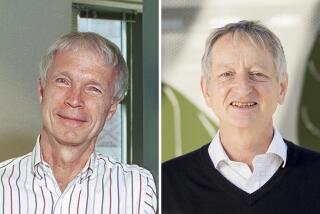Caltech theorist Kitaev wins new $3-million physics prize
- Share via
This year, the Fundamental Physics Foundation -- founded by Internet investor Yuri Milner to recognize “scientific breakthroughs” and to communicate “the excitement of fundamental physics to the public” -- awarded inaugural prizes of $3 million to nine researchers.
One of the recipients was Caltech’s Alexei Kitaev, a professor of theoretical physics who has developed theoretical models for quantum computing.
In an email exchange with Science Now, Kitaev, who won a MacArthur “genius” grant in 2008 and who is currently in Russia, explained more about his work. He also touched on what it’s like hearing that you’ve won $3 million.
When and how did you hear that you had won the prize?
I heard in the middle of July. It took a few attempts to reach me because I was visiting my parents in Voronezh, Russia, and didn’t check my email very often. Then I received a phone call from Yuri Milner.
I first assumed that the $3 million would be shared among the winners. I was amazed that each person would receive that much.
What is quantum computing? Why do we need it?
Electrons and other microscopic objects (as well as some bigger objects) are “quantum”: They behave in a rather strange way, which is vastly different from anything we see in everyday life. This behavior is generally understood by physicists, but it is complex. Quantum computing is a proposed way to harness this complexity to solve certain computational problems.
For example, a quantum computer will easily break the codes that are commonly used in online commerce. (Fortunately, not all codes are vulnerable.) Quantum computers will help engineers to design nano-electronics devices and physicists to compare theory with experiment.
Why don’t we have quantum computers yet?
We don’t have enough control and precision when working with quantum objects. The present technologies have a long way to go to meet the requirements. We need great precision while doing many things in parallel; otherwise errors will accumulate faster than we can correct for them.
My idea was to replace active error correction, which requires constant monitoring, with some natural process. I hope it will be less costly and more efficient.
Specifically, you won the prize “for the theoretical idea of implementing robust quantum memories and fault-tolerant quantum computation using topological quantum phases with anyons and unpaired Majorana modes.” What does that mean?
A “topological quantum phase” is a special arrangement of electrons or other microscopic elements in a suitable material at a very low temperature. (In practice, it might look like a computer chip, but implementations can vary dramatically.) I proposed to use such systems for storing quantum information and protecting it from errors.
This is somewhat similar to the way classical bits of information are stored on a hard drive. Each bit is represented by a little piece of magnetic film, which in turn consists of microscopic magnets pointing in the same direction. If one magnet accidentally turns in the wrong direction, it is quickly corrected by its neighbors. But in the quantum case, one cannot picture the suitable arrangement and the correction process so easily.
How did you get interested in quantum computing?
I was lucky to learn about it when it first started. The idea was introduced by Yuri Manin in his book “Computable and Uncomputable,” which was published in Russian in 1980. The book is about mathematical logic, but the preface tries to connect this highly abstract subject to the real world. It has two paragraphs about quantum mechanics -- its complexity and computational power.
I was fascinated, but the idea was too vague, and I knew too little to develop it. I kept it on my radar, learned about the important work by Richard Feynman and other developments, and started working on the subject when it matured.
What will you talk about in the public lecture you’re required to deliver?
I have not yet decided about the time and topic. I’d love to speak about something quantum, but it might not work for an unprepared audience.
Three million dollars is a lot of money! What are you going to do with it?
I don’t know yet. I am thinking about using part of the money for some educational effort.
Click here to learn more about the Fundamental Physics Prize.







